- Home
- Tom Stoppard
The Dog It Was That Died and Other Plays Page 3
The Dog It Was That Died and Other Plays Read online
Page 3
MATRON: Thank you, Commodore—please continue with the mowing.
ARLON:I don’t take orders from you, you’re just a figure-head and I’ve seen better ones on the sharp end of a dredger.
MATRON: Now, Commodore, do you want your rum ration with your cocoa or don’t you?
ARLON:If I mow the lawn it is because it pleases me to do so.
(The mowing continues.)
MATRON: Welcome to Clifftops, Mr Blair. I saw you talking to the Commodore from the window. He’s one of our more difficult guests. I do hope it wasn’t too awkward for you.
BLAIR:It’s all right. He caught me on the wrong foot for a moment.
MATRON: You’ll be wanting Dr Seddon. Let’s go inside.
BLAIR:Thank you.
(They walk a few yards of gravel and then they are in interior.)
MATRON: He’s probably looking in on the ping-pong players in the library.
BLAIR:Ping-pong in the library? Isn’t that rather disturbing?
MATRON: I suppose it is but most of them are already rather disturbed when they get here. See that one over there? He’s dangerous. Let me take your coat.
BLAIR:I haven’t got a coat.
MATRON: Never mind—in here—quick!
(BLAIR is pushed through a door which then closes.)
BLAIR:What—?
MATRON: Sssh.
BLAIR: (Whispering) Where are we?
MATRON: In the coat cupboard. We haven’t got long so don’t waste a minute.
BLAIR:Really, Matron . . .
MATRON: Don’t Matron me, I blew your cover the moment you showed your limp. I’m match fit and ready to go—parachute, midget submarine, you name it. The last show wasn’t my fault, the maps were out of date.
BLAIR:Will you please open the—
(The door is opened.)
SEDDON: Who is in there?
BLAIR:Ah, good afternoon— I’m looking for Dr Seddon.
MATRON: (Sweetly) And this, of course, is the coat cupboard.
BLAIR:Awfully nice.
SEDDON: Thank you, Bilderbeck. You may leave our visitor to me now.
MATRON: Matron to you, if you don’t mind.
SEDDON: Have you had your tablets?
MATRON: (Receding) Mind your own business.
SEDDON: That’s Bilderbeck. She used to dress up as a matron to oblige a chap she got mixed up with in Washington. When she was confronted with the photographs she insisted that she was giving him first aid and she’s been sticking to her story ever since. It’s the only uniform we allow here. We found that they tended to set people off. So we’re all in civvies. Not even a white coat, as you see. You must be Blair. I’m Dr Seddon.
BLAIR:How do you do. Giles Blair. Look, don’t take this amiss but would you have any form of identification?
SEDDON: First sensible remark I’ve heard today, counting the ones by the staff. Let’s go to my office and have a cup of tea.
BLAIR:Thanks very much.
SEDDON: This way. How are things in London?
BLAIR:Relatively sane.
SEDDON: I know what you mean. My time with the firm was excellent preparation for Clifftops.
BLAIR:Oh . . . were you—?
SEDDON: Q10.
BLAIR:Code-breaking?
SEDDON: Code-making. You may have heard of consonantal transposition. Scramble your own telephone. That was my contribution to the fun and games.
BLAIR:Really? No, I . . .
SEDDON: We go up these stairs now. Yes, they never took it up. Said it was too difficult, or too simple, one or the other.
BLAIR:How did it work?
SEDDON: Posetransing stantocons, titeg?
BLAIR:Sorry?
SEDDON: Transposing consonants—get it?
BLAIR: (Faintly) Ingenious.
SEDDON: The trick was that there were no rules as such. You had to do it like improvising music. It just needed a little tackpris but cos fork the cuffing ditios dookn’t tag the feng tif of.
BLAIR:What?
SEDDON: Moo yee sot I wean; tackpris! Well too yot, Blair . .
BLAIR:Yot?
SEDDON: You see—pick it up in no time! Come up to the belfry, I’ve got something up there which will interest you.
BLAIR:What?
SEDDON: Bats.
BLAIR:Bats in the belfry?
SEDDON: Had them for years without knowing it. I say, not that way . . .
BLAIR:Excuse me—I’ve got to find someone.
(BLAIR starts huriying back down the stairs.)
SEDDON: Blair—?
BLAIR:Terribly sorry—I really have to go.
(He gallops down the stairs. We go with him.)
SEDDON: (Distantly) Blair . . . !
(At the bottom of the stairs there is a collision.)
BLAIR:I’m terribly sorry!
PURVIS: Blair!
BLAIR:Purvis! Thank goodness.
PURVIS: I’m very glad to see you.
BLAIR:I’m not sorry to see you. I’m damned if I can flush out anyone in authority. Where’s the chap who’s supposed to be running this show?
PURVIS: You mean Dr Seddon? I’ll see if I can raise him for you.
BLAIR:Just as a courtesy . . . It was you I came to see, of course.
PURVIS: Really? That’s awfully nice of you. I was about to have my constitutional. Care to accompany me?
BLAIR:Glad to give you a shove. Front door?
PURVIS: Can’t do the steps. This way is better.
BLAIR:How do you feel?
PURVIS: Like a mermaid on wheels. Did I hurt your leg?
BLAIR:That wasn’t you. Burnt my fingers pulling Pamela’s chestnuts out of the fire, nearly knocked my Hilderson lantern clock off the mantel and got kicked by the donkey for my pains.
PURVIS: I’m awfully grateful to you for coming. It’s impossible to have a sensible conversation with anyone in this place.
(They move to the exterior, garden.)
There’s a path through the rhododendrons to a view of the sea.
BLAIR:Tip me off if we run into Seddon.
PURVIS: He’s probably up in the bell tower collecting guano for the rose-beds.
BLAIR:Quite a decent clock up there. Reminds me a little of St Giles’s in Cambridge. If it’s a turret movement, I’d like to have a look at it. Did you say guano?
PURVIS: Yes. Seddon discovered a colony of bats up there the other day.
BLAIR:Bats in the belfry? Oh dear.
PURVIS: What’s up?
BLAIR:Perhaps it would be better if I didn’t see him. I’ll drop him a note.
PURVIS: This is my favourite path. You can follow the top of the cliffs all the way round nearly to Cromer. At least you could if it wasn’t for the wheelchair because of the boundary fence. Whoa!
BLAIR:Sorry.
PURVIS: Don’t worry, this thing has got brakes. I don’t come down this far if I’m on my own.
BLAIR:It is rather dangerous.
PURVIS: Not that. It’s just a question of getting back up. You need strong wrists. There’s a little flat bit to the side here, you could sit on that stump.
BLAIR:Fine. This is very pleasant. Do you mind if I pollute the atmosphere?
(BLAIR lights his pipe and sucks on it.)
Which way are we looking?
PURVIS: About north-east. That’s the Dogger Bank out there, over the horizon a bit . . . the scene of the last occasion on which the Russian battle fleet engaged the British.
BLAIR:Really? When was that?
PURVIS: Ages ago. The Russian navy fired on some British trawlers.
BLAIR:Why?
PURVIS: It was a mistake. They thought the trawlers were Japanese torpedo boats.
BLAIR:In the North Sea?
PURVIS: As I said it was a mistake. I think it was a bit foggy, too.
BLAIR:It must have been.
PURVIS: It damned nea
rly led to war.
BLAIR:I should think it did.
PURVIS: The Tsar had to apologize to the King.
BLAIR:Oh . . .
PURVIS: Different Russia, of course.
BLAIR: (Regretfully) Yes, indeed.
PURVIS: They’re getting there slowly.
BLAIR:Sorry?
PURVIS: Two steps forward, one and a halfback. Narrowing the gap between rich and poor. That’s what it’s all about.
BLAIR:What?
PURVIS: Money, wealth.
BLAIR:I thought it was about freedom.
PURVIS: That’s a luxury which has to be paid for. That’s why the rich have always had it.
BLAIR:There’s nothing in English law about what a man is worth.
PURVIS: There doesn’t have to be. People only desire the freedom that is within their imagination. When you limit their horizon economically you limit their imagination. That’s why the proletariat need the intellectuals—the failure of the masses to act is a failure of the mass imagination.
BLAIR:Purvis, what are you doing?
PURVIS: Just trying it out. How does it sound?
BLAIR:Like balderdash.
PURVIS: Really?
BLAIR:Doesn’t it sound like balderdash to you?
PURVIS: Sometimes it does, sometimes it doesn’t. That’s my problem.
BLAIR:Well, we knew you had a problem, Purvis. What exactly is it?
PURVIS: Blair . . . you know how it is when you telephone someone and say, shall we meet at the Savoy Grill or Simpson’s, and he says, I don’t mind, make it Simpson’s if you like, or do you prefer the Savoy, and you say no, that’s fine, eight thirty suit you?, and he says fine, eight thirty, and you hang up—and suddenly you think—did he say Simpson’s or the Savoy? It’s gone, you know. You’ve lost it. Well, that’s what’s happened to me.
BLAIR:The Savoy or Simpson’s?
PURVIS: No, it isn’t really like that, except that when you try to remember back, both ways sound equally right. I’m going back thirty-five years now, when I was still being run by Gell, or Rashnikov. Now Gell is dead and Rashnikov is probably dead too. They set me going between them like one of those canisters in a department store, and they disappeared leaving me to go back and forth, back and forth, a canister between us and you, or us and them.
BLAIR:I didn’t quite follow that last bit.
PURVIS: I remember some of it, no problem. I remember striking up a conversation with Rashnikov in one of the stacks in the Westminster Library—political economy. Or perhaps he struck up a conversation with me. I remember having a few dinners with him, meeting some of his friends, arguing long into the night about politics, and I remember finally being asked to look something up for him in our back-numbers room in Whitehall . . . You remember that basement we used to have before we had microfilm? The thing he wanted was perfectly innocuous, but by that time, of course, I knew he was supposedly on the staff of the Soviet Commercial Attaché, so the next time he asked me to look something up, something which wasn’t quite so innocuous, I of course reported the whole thing to Gell who was my superior.
BLAIR:Of course.
PURVIS: Sure enough, Gell told me to pretend to swallow the bait and to await instructions.
BLAIR:Straightforward enough.
PURVIS: It wasn’t. Rashnikov was playing a subtle game. He had told me to tell Gell.
BLAIR:To tell him what?
PURVIS: To tell Gell that I was being recruited by RashnIkov. So that Gell would be fooled into thinking that I was pretending to be Rashnikov’s man while I was really Gell’s man.
BLAIR:Looking at it from Rashnikov’s point of view.
PURVIS: Yes.
BLAIR:And did you tell Gell that this was going on, that Rashnikov had told you to tell Gell?
PURVIS: Yes. I did. But . . .
BLAIR:But . . . ?
PURVIS: Well, I’m pretty sure that when I told Gell that all this was going on, I was also acting on Rashnikov’s instructions.
(Pause.)
BLAIR:But, if that were so, no doubt you told Gell that it was so. No doubt you told Gell that Rashnikov had told you to tell Gell that Rashnikov had told you to tell him that you were being offered the bait.
PURVIS: That’s what I can’t remember. I’ve forgotten who is my primary employer and who my secondary. For years I’ve been feeding stuff in both directions, following my instructions from either side, having been instructed to do so by the other, and since each side wanted the other side to believe that I was working for it, both sides were often giving me genuine stuff to pass on to the other side . . . so the side I was actually working for became . . . well, a matter of opinion really . . . it got lost.
(Pause.)
Blair?
BLAIR:I didn’t speak.
PURVIS: Well, I just carried on doing what I was told . . . and one day, not very long ago, I started thinking about my retirement. The sherry party with the Chief. The presentation clock. The London Transport senior citizen’s bus pass. The little dacha on the Vistula.
BLAIR:Purvis . . . ?
PURVIS: Exactly. Hang on a sec, I thought—hello!—which—? . . . ? And blow me, I found I had forgotten.
BLAIR:But you worked for Gell. For me.
PURVIS: I worked for Rashnikov too.
BLAIR:Only because we asked you to play along.
PURVIS: He asked me to play along.
BLAIR:Let’s not get into that again. You’re one of us.
PURVIS: Well, I’d have to be, wouldn’t I, to be of any use to him.
BLAIR:You’re a church warden.
PURVIS: I thought about that but if one were covering up would one join a left-wing book club instead, for instance? Obviously not. Well, I suppose one might as a double bluff. Or, then again, one might not, as a triple bluff. I don’t think I’m going to get to the bottom of this, to my infinite regress, I mean regret.
BLAIR:This is nonsense.
PURVIS: Rashnikov said to me once, you’ve got to believe in the lie so strongly that even if you confessed they wouldn’t believe you. Or was that Gell? One of the two.
BLAIR:All you’ve got to do is remember what you believed.
PURVIS: I remember I was very idealistic in those days, a real prig about Western decadence. On the other hand I was very patriotic and really didn’t much care for foreigners. Obviously one scruple overcame the other, but as to whether it was the Savoy or Simpson’s . . . At some point it must have ceased to matter to me. That’s what I find so depressing. Did they tell you I was depressed? It’s on my file here: Purvis is extremely depressed.
BLAIR:My dear chap..
PURVIS: Well, it is extremely depressing to find that one has turned into a canister. A hollow man. Like one of those Russian dolls—how appropriate! Yes, I’m like one of those sets of wooden dolls which fit into one another as they get smaller. Somewhere deep inside is the last doll, the only one which isn’t hollow. At least, I suppose there is. There used to be. Perhaps I’m not even a set of dolls any more, perhaps I’m an onion. My idealism and my patriotism, folded on each other, have been peeled away leaving nothing in the middle except the lingering smell of onion.
BLAIR:Please don’t cry.
PURVIS: I’m sorry. It’s the onion. Oh stuff it, Blair!
BLAIR:That’s the spirit. To the taxidermist with the lot of it.
(Sniffles and pause.)
PURVIS: Did you get the parrot by the way?

 The Dog It Was That Died and Other Plays
The Dog It Was That Died and Other Plays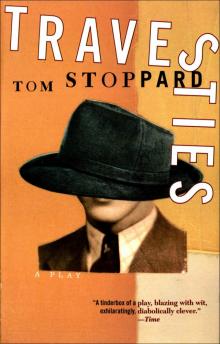 Travesties
Travesties Jumpers
Jumpers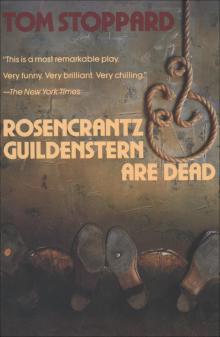 Rosencrantz and Guildenstern Are Dead
Rosencrantz and Guildenstern Are Dead Rock 'N' Roll
Rock 'N' Roll Plays 5
Plays 5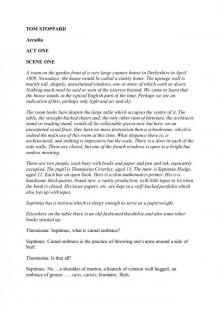 Arcadia
Arcadia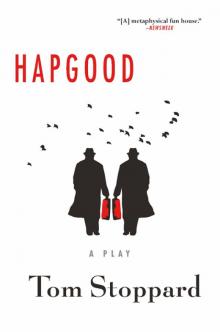 Hapgood
Hapgood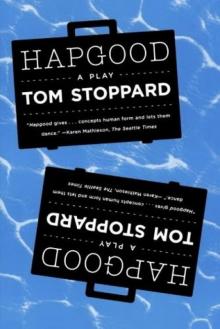 Hapgood: A Play
Hapgood: A Play Every Good Boy Deserves Favor & Professional Foul
Every Good Boy Deserves Favor & Professional Foul The Coast of Utopia: Voyage, Shipwreck, Salvage
The Coast of Utopia: Voyage, Shipwreck, Salvage Lord Malquist & Mr. Moon
Lord Malquist & Mr. Moon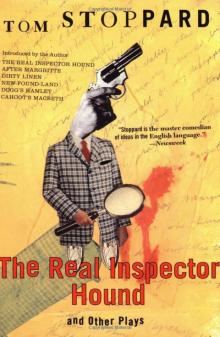 The Real Inspector Hound and Other Plays
The Real Inspector Hound and Other Plays Tom Stoppard Plays 1
Tom Stoppard Plays 1 Lord Malquist & Mr. Moon: A Novel
Lord Malquist & Mr. Moon: A Novel Shipwreck
Shipwreck Tom Stoppard Plays 3
Tom Stoppard Plays 3 Tom Stoppard Plays 2
Tom Stoppard Plays 2 Rosencrantz and Guildenstern are dead. Arcadia
Rosencrantz and Guildenstern are dead. Arcadia